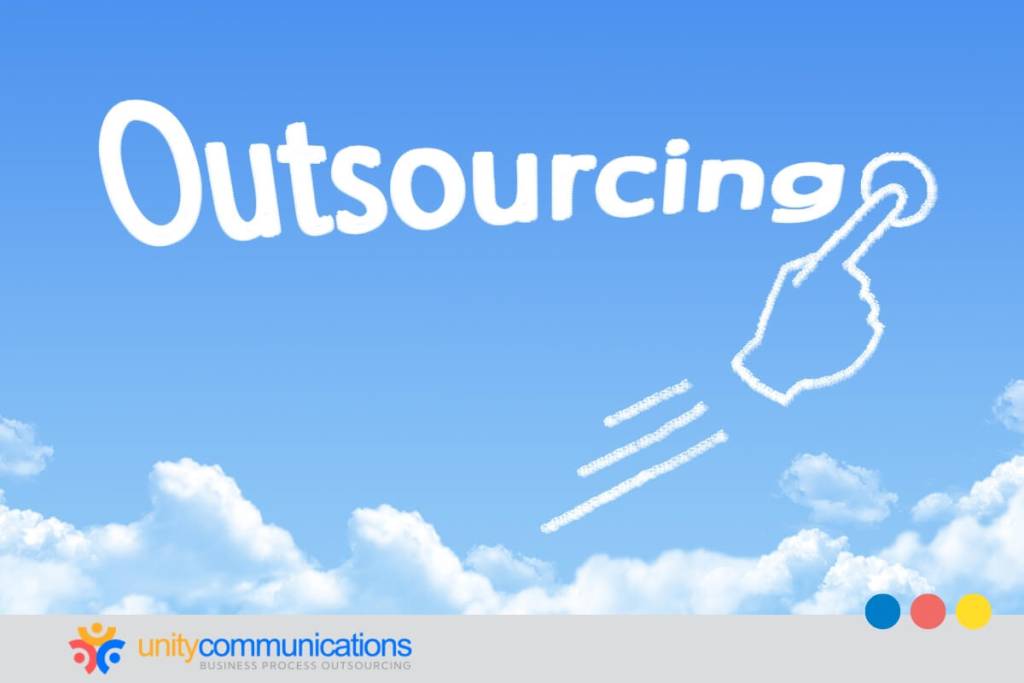IN THIS ARTICLE
Table of Contents
Enterprises face growing demands to embrace sustainable measures amidst global challenges such as climate change, resource limitations, and social disparities. Businesses now recognize that sustainability is not just a moral obligation but a crucial element to ensure enduring success.
In light of this shift in perspective, the business process outsourcing (BPO) sector is redefining its functions to actively contribute to different facets of sustainability.
This article dispels myths and shares truths about the sustainability of BPO services. It also discusses how the BPO industry contributes to environmental, social, and corporate governance (ESG) goals. Keep reading to learn more.
Facts and Myths About the Sustainability of BPO Services

Dispelling common myths and recognizing the outsourcing industry’s positive contributions can lead to a more nuanced understanding of its overall sustainability. Let’s discuss each in detail.
Here are a few enduring myths about the sustainability of BPO services and their reality:
- BPO services are inherently unsustainable. In contrast, many BPO companies are adopting green practices, energy-efficient technologies, and sustainable office policies.
- BPO firms operating in developing countries disregard labor rights. However, responsible operators adhere to fair labor practices and invest in employee well-being, contributing positively to social development.
- BPO providers only “greenwash” to improve their image. Some BPO providers might engage superficially with ESG approaches, “greenwashing” their brand without implementing substantive changes. Evaluating the initiatives and track record of any prospective third-party vendor remains crucial.
- BPO leads to job displacement. While automation and offshoring might displace some jobs in specific sectors, BPO companies also create new employment opportunities in various fields, including technology, data analysis, and customer service.
To further emphasize the sustainability of outsourced services, consider the following points:
- Reduced carbon footprint. BPO companies committed to sustainability recognize the importance of transitioning to renewable energy sources. By incorporating solar, wind, geothermal, or hydroelectric power, BPO centers substantially diminish their carbon footprint and overall environmental influence.
- Improved energy efficiency. BPO vendors can consolidate operations and leverage centralized facilities, potentially leading to less energy consumption, travel, and waste generation. By improving energy efficiency, outsourcing companies can further reduce their environmental impact.
- Reduced emissions with remote work. Remote work can curb greenhouse gas emissions. BPO thus offers flexible work options to reduce carbon emissions, traffic congestion, and air pollution by eliminating the need to commute to the office. Doing so also allows them to cater to the 98% of employees who want to work remotely.
- Ethical sourcing and compliance. BPO organizations, especially those operating in regulated industries, are subject to strict ethical sourcing and compliance guidelines. These foster responsible supply chain practices and ensure alignment with ESG principles.
- Corporate social responsibility initiatives. Many BPO providers actively engage in social responsibility programs, supporting local communities through education, healthcare, and environmental projects. These programs strengthen their social impact and foster positive community relationships.
- Diverse and inclusive environments. BPO firms operate in various locations, which can offer employment opportunities for marginalized communities and people with disabilities. Additionally, they can implement inclusive hiring practices and foster a culture of equality within their workforce.
- Improved digital practices. BPO and digital transformation go hand in hand. BPO companies often embrace efficient software and digital solutions, minimizing paper usage and streamlining processes. Such practices translate to lower resource consumption and reduced physical waste.
- Technological advancement. BPO firms often invest in innovation and technology to improve efficiency, productivity, and service quality. Advancements in technology lead to solutions that address environmental challenges, enhance social well-being, and promote good governance.
- Transparent reporting and accountability. BPO firms can enhance transparency by reporting sustainability metrics and performance, demonstrating accountability to stakeholders, investors, and the broader community. Transparent reporting fosters trust and enables informed decision-making.
Similar to other industries, the BPO market can have gaps in its sustainability initiatives. Embracing best practices, ethical considerations, and continuous improvement can enhance outsourcing’s economic and environmental impact.
Ways BPO Contributes to ESG Goals

Sustainability entails meeting current needs without compromising the opportunities available to future generations. It involves ESG considerations, which businesses progressively integrate into their operational frameworks. According to reports, 57% of companies incorporate ESG into their organization’s vision and mission.
So, what is BPO’s role in promoting ESG goals? Third-party service providers support businesses in attaining their sustainability goals, lessening their environmental impact, fostering innovation, and producing beneficial social outcomes.
They can help businesses optimize processes, adopt renewable energy, implement eco-friendly practices, access innovative technologies, create job opportunities, enhance skill development, and engage with local communities. Here’s a closer look.
Ensuring a Sustainable Supply Chain
BPO companies perform the following activities to guarantee a sustainable supply chain:
- Maintaining supply chain sustainability. BPO companies can advance green practices across the supply chain by integrating sustainability criteria into the supplier selection process. This all-in-one approach ensures that the positive impact extends beyond individual organizations.
- Advocating for sustainable practices among suppliers. Collaboration between BPO firms and clients can encourage sustainable practices among suppliers. By establishing sustainability standards, they can involve suppliers in environmentally friendly practices, ethical sourcing, and responsible manufacturing.
- Promoting environmentally conscious sourcing and manufacturing. BPO firms promote environmentally conscious sourcing and manufacturing. By prioritizing suppliers with robust ESG measures, they contribute to the widespread adoption of sustainable practices. This cultivates a more resilient supply chain and benefits all stakeholders.
Driving Green Innovation
Consider the following BPO functions that enable green innovation:
- Driving sustainable product development. Beyond operational support, BPO firms offer specialized research and development (R&D) to aid clients in creating innovative, environmentally friendly products. These cater to the rising demand for eco-conscious choices and enhance the positive image of businesses.
- Using data analytics for resource optimization. BPO firms can employ data analytics to optimize resource utilization, minimize waste, and decrease energy consumption in the context of sustainability. Data-driven decision-making ensures targeted and effective sustainability efforts, fostering a more environmentally friendly operation.
- Cultivating sustainability culture in business operations. Sustainability requires a shift within the organization. Thus, BPO companies instill an innovation and sustainability culture among their staff. They promote green initiatives by offering training on best practices and integrating ESG objectives into performance evaluations.
Promoting Social Sustainability
Here are a few ways BPO providers promote social sustainability:
- Generating employment opportunities in neighboring countries. BPO creates jobs, contributing to the economic and social advancement of local communities. These employment opportunities empower individuals, providing avenues to enhance their livelihoods and overall quality of life. They also promote social sustainability and equity.
- Advocating diversity and equitable labor practices. BPO firms can cultivate an environment that values differences and encourages creativity by championing diversity and inclusion within the workplace. Adhering to fair labor practices, prioritizing employee well-being, and offering competitive wages are also essential elements of sustainability.
The Bottom Line

BPO companies are acknowledging their potential to make a positive impact on the environment. By adopting eco-friendly practices, encouraging green innovation, and supporting social sustainability, BPO can emerge as a catalyst for positive change, helping address climate change and environmental degradation.
Through collaboration with clients, suppliers, and employees, BPO services can instigate significant change, leaving a lasting positive influence on the environment, communities, and the global pursuit of sustainability.
The journey towards sustainability begins with the right partnership. Let’s connect if you seek a partner to align with your sustainability goals while optimizing your business operations!





